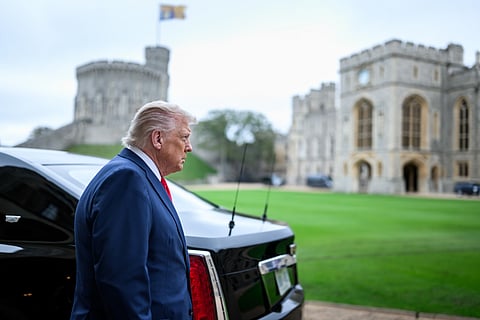

President Donald Trump signed an executive order on Thursday declaring that the planned sale of TikTok's U.S. operations to American and international investors meets national security standards outlined in a 2024 law.
The order delays enforcement of the app's ban until January 20, allowing time to separate U.S. assets, secure investors, and obtain Chinese government approval.
The new U.S. entity is valued at approximately $14 billion, a figure far below some analyst projections of $30 billion to $40 billion without the algorithm.
Vice President JD Vance noted the valuation during an Oval Office briefing, emphasizing efforts to protect user data privacy.
Trump credited TikTok's role in his reelection, highlighting its 170 million U.S. users and his own 15 million followers on the platform.
The White House launched an official TikTok account last month.
The executive order specifies that TikTok's recommendation algorithm will be retrained and monitored by U.S. security partners, with operations controlled by the new joint venture.
Trump stated that Chinese President Xi Jinping approved the plans following a direct conversation.
China's foreign ministry expressed support for business negotiations under market rules while urging a fair environment for Chinese firms in the U.S.
Investors including Oracle, Silver Lake, and possibly Abu Dhabi-based MGX are set to hold about 50% stake, with ByteDance shareholders taking 30%.
Michael Dell, Rupert Murdoch, and others are expected to join as world-class investors.
ByteDance will appoint one of seven board members, with Americans filling the remaining seats, and hold less than 20% equity to comply with the law.
A senior White House official confirmed these governance details on Saturday.
The Trump administration requested a multibillion-dollar payment from investors as a "finders' fee," which the group, including Larry Ellison and the Murdochs, agreed to without hesitation.
This approach has drawn sharp criticism from experts who label it a "shakedown scheme" undermining free market principles.
Luigi Zingales, a University of Chicago finance professor, warned that such tactics shift business focus from innovation to rent-seeking.
Republican lawmakers, including Representatives Brett Guthrie, Gus Bilirakis, and Richard Hudson, called for more transparency to ensure a clean break from Chinese influence.
Chinese media reports suggested ByteDance would retain operational roles, though these articles were later removed.
Yale's Jeffrey Sonnenfeld described the interventions as extortion, noting private CEO horror but public silence due to retaliation fears.
The deal's progress highlights ongoing tensions between national security, business interests, and government involvement in private transactions.